-

新人教版高中英语必修3Unit 1 Festivals and Celebrations-Reading and Thinking教学设计
The topic of this part is “Discover the reasons for festivals and celebrations.The Listening & Speaking & Talking part aims at talking about the experiences and feelings or emotions about the festivals and celebrations. This section aims at detecting the reason why the people celebrate the festivals, the time, the places, the types and the way of celebrations. It also explains why some traditions in the old celebrations are disappearing, like the firecrackers in the big cities and some new things are appearing like the prosperity of business or commerce. 1. Students can talk about what festivals they know and the reasons and the way of celebrating them.2. Students should learn the reading skills such as the headline and get the topic sentences, the structures of articles.3. Students can understand the past, the present situation of some festival around the world and why there are some changes about them. 4. Students can have the international awareness about the festivals.1. Students should learn the reading skills such as the headline and get the topic sentences, the structures of articles.2. Students can understand the past, the present situation of some festival around the world and why there are some changes about them.Step 1 Lead in---Small talkWhat festival do you like best ? Why ?I like the Spring Festivals because I can set off the fireworks, receive the lucky money and enjoy the Gala with my families.Step 2 Before reading---Pair workWhy do people celebrate different festivals ?The Spring Festivals is to celebrate the end of winter and the coming of spring and new life.The Mid-autumn Day is to celebrate the harvest and admire the moon.

新人教版高中英语必修3Unit 1 Festivals and Celebrations-Listening &Speaking&Talking教学设计
The theme of this section is “Talk about festival activities and festival experiences”.Festival and holiday is a relaxing and interesting topic for students. This part talks about the topic from the daily life of students’. In the part A ---Listening and Speaking, there are three conversations among different speakers from three countries(Japan, Rio and China), where the speakers are participating in or going to participate in the festivals and celebrations. So listening for the relationship among them is a fundamental task. Actually, with the globalization and more international communication, it is normal for Chinese or foreigners to witness different festivals and celebrations in or out of China. In the Conversation 1, a foreign reporter is interviewing a Japanese young girl who just had participated in the ceremony of the Coming-of-Age Day on the street and asking her feeling about the ceremony and the afterwards activities. Conversation 2, Chinese girl Li Mei is witnessing the Rio Carnival for the first time, and her friend Carla gives her some advice on the costumes which enables her to match with the carnival to have a good time. Conversation 3, a Chinese guide is showing a group of foreign visitors around the Lantern Festival and introducing the customs of the festival to them. The three conversations have a strong vitality and insert the festival and cultural elements from different countries. So perceiving the festivals and cultures from different countries is the second task. At the same time, the scripts also insert the targeted grammar --- v-ing as attributive and predicative, which students can perceive and experience in a real context and make a road for the further study. That is the third task. In the Part B--- Listening and Talking, the theme is “Talk about festival experience”, which is the common topic in our daily conversations. During the conversation, Song Lin, a Chinese student, asked Canadian friend Max about how to spend Christmas. In the conversation, Song Lin talked about experience and the feelings during the Chinese Spring Festival, during which there are not only some enjoyable things but some unpleasant things. After the listening, perhaps students find there are some similarities between Christmas and the Chinese Spring Festival as there are some differences in the origins and celebrations. For example, people always visit friends and relatives, decorate their houses, have a big dinner together, chat and give presents to each other.

新人教版高中英语必修3Unit 2 Morals and Virtues-Discovering Useful Structure教学设计
1. 表示时间。Hearing these stories, I’m skeptical about the place. = When I heard these stories. . . 2. 表示原因。Not knowing his address, I can’t send this book to him. = Because/Since/As I don’t know his address. . . 3. 表示结果。His father died, leaving him a lot of money. =. . . and left him a lot of money4. 表示条件。Going straight down the road, you will find the department store. = If you go straight down the road. . . 5. 表示让步。Being tired, they went on working. =Although they were tired. . . 6. 表示行为方式、伴随情况或补充说明。He lay on the grass, staring at the sky for a long time. =. . . and stared at the sky for a long time注意:非谓语动词作状语时, 如所提供的动词不能和句子中的主语保持一致, 动词-ing形式必须有自己的逻辑主语, 通常由名词或代词来担任, 这就是独立主格结构。The last bus having gone, we had to walk home. (having gone的逻辑主语是the last bus, 而不是we)Weather permitting, the football match will be played on Friday. (permitting的逻辑主语是time, 而不是the football match)Step 7 Practice1. ________(study) hard, you are sure to get first prize. 2. People use plastic in their daily life, _______(leave) large amounts of waste. 3. ________(work) hard at your lessons, you are to succeed. 4. The old man, ____________(work) abroad for twenty years, is on the way back to his motherland. 5. ______________(finish) his homework, he was playing on the playground. Answers: 1. Studying 2. leaving 3. Working 4.having worked 5. Having finishedStep 8 HomeworkFinish the homework on Page 22.

新人教版高中英语必修3Unit 3 Diverse Cultures-Discovering Useful Structure教学设计
Step 4 PracticeRead the conversation. Find out which words have been left out.Justin: Linlin, I’m going to Guizhou Province next month. I’m super excited! Any recommendations for places to visit?Linlin: Wow, cool! Guizhou is a province with a lot of cultural diversity. Places to visit...well, definitely the Huangguoshu Waterfall first.Justin: What’s special about the waterfall?Linlin: Well, have you ever heard of the Chinese novel Journey to the West ?Justin: Yes, I have. Why ?Linlin: In the back of the waterfall, you will find a cave, which is the home of the Monkey King.Justin: Really? Cool! I’ll definitely check it out.Linlin:And I strongly recommend the ethnic minority villages. You’ll find Chinese culture is much more diverse than you thought.Justin:Sounds great, thanks.Answers:Justin: Linlin, I’m going to Guizhou Province next month. I’m super excited! Do you have any recommendations for places to visit?Linlin: Wow, that’s cool! Guizhou is a province with a lot of cultural diversity. What are some places to visit in Guizhou ? Well, definitely the Huangguoshu Waterfall is the first place to visit in Guizhou Province.Justin: What’s special about the waterfall?Linlin: Well, have you ever heard of the Chinese novel Journey to the West ?Justin: Yes, I have heard of the Chinese novel Journey to the West . Why do you ask if I have heard of the Chinese novel Journey to the West?Linlin: In the back of the waterfall, you will find a cave, which is the home of the Monkey King from Journey to the West.Justin: That’s really true? It’s Cool! I’ll definitely check it out.Linlin:And I strongly recommend the ethnic minority villages on your trip to Guizhou Province. You’ll find Chinese culture is much more diverse than you thought it was.Justin:This all sounds great, thanks.

新人教版高中英语必修3Unit 3 Diverse Cultures-Reading for Writing教学设计
The topic of this part is “Describe a place with distinctive cultural identity”.This section focuses on Chinese culture by introducing Chinatown, whose purpose is to show the relationship between the Chinese culture and American culture. The Chinese culture in Chinatown is an important part of American culture. Chinatown is an important window of spreading Chinese culture and the spirit homeland of oversea Chinese, where foreigners can experience Chinese culture by themselves.Concretely, the title is “Welcome to Chinatown!”, from which we can know that the article aims at introducing Chinatown. The author used the “Introduction--Body Paragraph--Conclusion” to describe the people, language, architecture, business, famous food and drinks and people’s activities, which can be a centre for Chinese culture and shows its unique charm.1. Read quickly to get main idea; read carefully to get the detailed information.2. Learn the characteristics of writing and language.3. Learn to introduce your own town according to the text.4. Learn to correct others’ writing.1. Learn the characteristics of writing and language.2. Learn to introduce your own town according to the text.Step 1 Lead in ---Small talkIn the reading part, we mentioned the Chinatown of San Francisco. How much do you know about Chinatown of San Francisco ?Chinatown is a main living place for Chinese immigrants, where you can see many Chinese-style buildings, costumes, operas, restaurants, music and even hear Chinese.Step 2 Before reading ---Predict the contentWhat is the writer’s purpose of writing this text ? How do you know ?From the title(Welcome to Chinatown) and some key words from the text(tourist, visit, visitors, experience), we can know the purpose of the text is to introduce Chinatown and show the relationship between Chinese culture and American culture.

新人教版高中英语必修3Unit 5 The Value of Money- Discovering Useful Structure教学设计
Step 3 Meaning1. 过去将来时表示从过去某一时间来看将要发生的动作或存在的状态, 常用在宾语从句中。一般由“would/should +动词原形”构成。She hoped that they would meet again someday. 她希望将来有一天他们能再见面。2. was/were going to+动词原形: 表示过去将要发生或很有可能发生的动作, 常用于口语中, 表示预言、意图或者打算等。He was going to start work the following week. 他打算下星期开始工作。3. was/were about to do: 常用来表示即将发生的动作, “刚要/正要做……”。注意该结构不与任何时间状语连用。I felt that something terrible was about to happen. 我感到某种可怕的事情即将发生。4.was/were to do: 表示“曾计划做某事”, 如果表示“本来计划做某事, 动作没实现”, 则需用 “was/were to have done”。She said she was to have told me about the accident. 她说她本来想告诉我关于事故的事。5.Start, go, come, leave, see, meet等动词的过去进行时: 表示就过去某一时刻而言即将发生的动作。She was coming later. 她随后就来。I had just put on my overcoat and was leaving to visit a friend of mine. 我刚穿上外套要去看我的一个朋友。

新人教版高中英语必修3Unit 5 The Value of Money-Listening &Speaking&Talking教学设计
4. A:We’d like to have someone to say a word at the beginning to welcome the group.B:↙Who?A:We thought that you or Dr.Johnson might do it.B用降调说Who,其意思是问,对方想让谁在开场时致欢迎词。Step 6 Pronunciation---Practice1. Listen to the short conversation and mark the intonation with ↗, ↙ or ↙, ↗. Then discuss with a partner what they intend to convey by using different intonation.Owner: You know what ?↗ It’s a million-pound bank note↙.Waiter 1: Really ?↗(question)Waiter 2: Really !↙(unbelievable and surprised)Waiter 3: Really ?!↙↗(first question then surprised)2. Listen to the conversations. Underline the parts that are stressed and mark the intonation. Then talk about the implied meanings of the responses with different intonations. Listen again and repeat.1) Henry: It’s a nice suit.Owner: Oh, it’s perfect!↙(The intonation means it is very suitable for Henry.)2) Henry: Well, that’s very kind of you.Owner: Kind, sir ?↗(what you said is not right) No, it’s kind of you. You must come whenever you want and have whatever you like. Just having you sit here is a great honour !!↙(welcome you to come again)3)Henry:Well, to be honest, I have none. Oliver:(happily) What luck!(excited) Brother↗, what luck!↙(It means “Didn’t you hear it?”)Henry: Well, it may seem lucky to you but not to me!↗(angry) If this is your idea of some kind of joke, I don’t think it’s very funny. Now if you’ll excuse me, I ought to be on my way.↙(If so, I would leave.)Roderick: Please don’t go↙...(hope Henry can wait for a moment)Part B Viewing and Talking---Describe people’s changing attitudes in a film clipStep 1 Before-listening---Tell the filmYou are going to watch part of the film The Million Pound Bank Note. Look at these photos and guess what happens in the film.

新人教版高中英语必修3Unit 5 The Value of Money-Listening &Speaking教学设计
Step 4: Listen again and decide if the following statements are true (T) or false (F).1 It was the first time Chen Liyan's story was reported. T口 F口2 Chen found 10,000 yuan in a small plastic bag in Taiyuan railway station口 F口3 Wang Zheng apologized to Chen because he couldn't offer her more money. T口 F口4 Chen took out a large loan to cure her daughter, T口 F口5 Wang set up a fundraising website for Chen's daughter after Chen told him about her situation. T口 F口Step 5:After listening, discuss the questions.1 What kind of person do you think Chen Liyan is?Chen Liyan is generous and honest because she returned a large sum of money to the owner.2 Did Chen return the money because she didn't need it?No. She returned the money because it was the right thing to do. Evidence for this is that she refused to accept the reward money because she felt that it had not been earned. 3 Is it common for people to do what Chen did?It depends on the culture. In some countries it is quite common to return money that has been found. In other countries, people believe "Finders are keepers!" 4 How did Wang Zheng feel about the return of his money?He must have been very happy and relieved to have gotten his money back. We know this because he thanked Chen repeatedly and even offered her a reward.5 Why did Ma Dongbao tell Wang about Chen's family?He must have had great sympathy for Chen and her daughter and wanted to help them.'We know this because he arranged help for them. 6 How did the news reporter feel about Chen's actions?The news reporter felt that it showed that money wasn't the most important thing in life. We know this because the reporter told us that this is what Chen believes. and then said, “that's a great attitude to take."

新人教版高中英语必修3Unit 5 The value of money-Reading and Thinking教学设计二
? Could you offer me some kind of work here?? I don’t want your charity, I just want an honest job.? Careless: I landed in Britain by accident.Step 7:Consolidation.? Find Henry? Roderick and Oliver were I .making a bet when they saw Henry, a poor young man. ? Know Henry? About a month ago, Henry was sailing and later he found himself carried out to sea by a strong wind. Fortunately, he 2.was spotted by a ship. And it was the ship that brought him to 3.England? Offer money to Henry ? Oliver and Roderick gave Henry a letter and told him that there was money in it. They 4.persuaded him to accept it, and made him 5.promise that it wouldn't be opened until 2 o'clock.Step 8:Language pointsa large amount of: a large quantity of; a great deal ofe.g. They bought a large amount of furniture before they moved their new house.make a bet: make an arrangement to risk money, etc. on an event of which the result is doubtful.e.g. We made a bet on the result of the match.permit sb to do something: allow somebody to do somethinge.g. My mother doesn’t permit me to ride in the street after it rained.by accident: as a result of chancee.g. I only found it by accident.stare at: look at somebody or something with the eyes wide open in a fixed gaze( in astonishment, wonder, fear, etc)to be honest: to tell you the truth; to be franke.g. To be honest, I don’t think we have a chance of winning.Step7 Homework:What do you think will happen to Henry? Will the bank-note help him or get him into trouble?

新人教版高中英语必修3Unit 5 the value of money-Reading For Writing教学设计一
【参考范文】Narrator:(Henry is smiling as he leaves the restaurant. As he is walking down the street, he sees a sign for a place that cuts hair. He decides to get it cut. )H=Henry;B=Barber;R=rude manH:Good afternoon, I'd like to get a cut, if I may. (The barber looks at Henry's hair and continues cutting another man's hair. )Er, I'd really like a haircut. As you can see it's much too long. B:(in a rude manner) Yes, I can see that. Indeed, I can. H:Fine, well I'll have a seat then. (He sits in one of the barber's chairs. The barber turns to look at Henry. )B:It's quite expensive here, you know!Are you sure you can afford it?H:Yes. I think so. (In comes the rude man. )R:Hey you there. I need a haircut quickly. Can you do me straightaway?B:All right, then, get in the chair and I'll see what I can do. R:Thank you. (sits down in one of the barber's chairs)H:Excuse me, but I was here first. Aren't you going to do my hair first?B:This man's in a hurry. H:Well so am I!I insist that you cut my hair first. B:OK, but I'll have to be quick. This gentleman is waiting. H:Thank you. (They both become quiet. After his hair is cut, the barber tells Henry how much he must pay. Henry shows the barber the bank note. )B:Why, Mr . . . (looks shocked)H:Adams. Henry Adams. I'm sorry, I don't have any change. R:You're that Mr Adams! Well,I'm glad I waited or I might never have known it was you. B:Why, Mr Adams, please don't worry!(wearing a big smile) Nothing to worry about!Nothing at all!Please come back any time, even if you only need too little hairs cut!It will be my honour to serve you!
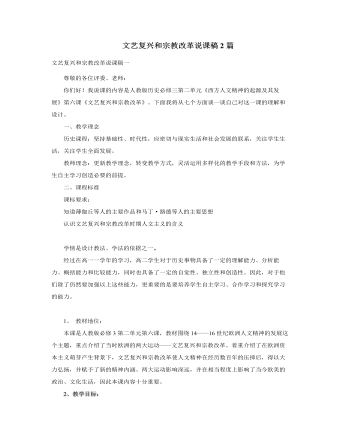
人教版高中历史必修3文艺复兴和宗教改革说课稿2篇
师:在科学发展过程中,前一个理论体系的不完善之处,往往是新的研究和新的发现的突破口。开普勒之后,意大利天文学家伽利略创制了天文望远镜,用更加精确的观察继续发展和验证哥白尼创立的新天文学理论。除了用望远镜进行天文观察以外,伽利略还开始进行自然科学的实验研究,哪位同学能给大家讲一讲伽利略在比萨斜塔上所作的关于物体自由下落的实验?生:(讲述这一实验)师:所以,伽利略在科学方面更加重要的贡献是奠定了近代实验科学的基础。(2)实验科学和唯物主义师:伽利略从实践上开辟了实验科学的方法,而英国唯物主义哲学家培根则从理论上阐述了实验科学的方法——归纳法。培根和伽利略同被称为实验科学之父,培根还有一句影响深刻的名言:“知识就是力量”,表明了他注重知识,尊崇科学的精神。我们再来概括一下意大利哲学家布鲁诺的唯物主义思想,是否有同学可以简述布鲁诺的生平事迹?
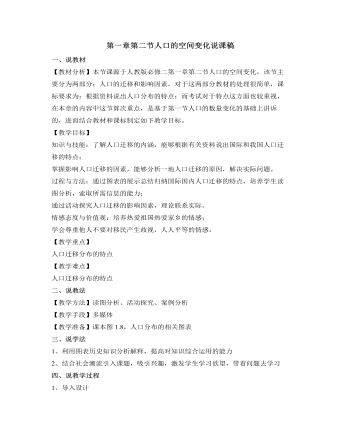
人教版高中地理必修2第一章第二节人口的空间变化说课稿
一、说教材【教材分析】本节课源于人教版必修二第一章第二节人口的空间变化,该节主要分为两部分:人口的迁移和影响因素,对于这两部分教材的处理很简单,课标要求为:根据资料说出人口分布的特点;而考试对于特点这方面也较重视,在本章的内容中这节算次重点,是基于第一节人口的数量变化的基础上讲诉的,进而结合教材和课标制定如下教学目标。【教学目标】知识与技能:了解人口迁移的内涵,能够根据有关资料说出国际和我国人口迁移的特点;掌握影响人口迁移的因素,能够分析一地人口迁移的原因,解决实际问题。过程与方法:通过图表的展示总结归纳国际国内人口迁移的特点,培养学生读图分析,索取所需信息的能力;通过活动探究人口迁移的影响因素,理论联系实际。情感态度与价值观:培养热爱祖国热爱家乡的情感;学会尊重他人不要对移民产生歧视,人人平等的情感。【教学重点】人口迁移分布的特点

人教版高中地理必修2第一章第三节人口的合理容量说课稿
【教学目标】知识与技能:理解环境承载力与环境人口容量的含义、两者的关系以及环境人口容量的影响因素;理解人口合理容量的含义,影响因素并掌握保持人口合理容量的做法;结合中国国情提出适合中国保持合理人口容量的措施过程与方法:通过问题探究及案例分析理解环境承载力与环境人口容量的关系及影响因素;通过问题探讨掌握保持人口合理容量的措施。情感态度与价值观:树立并强化学生的可持续发展观念,科学发展观。激发学生爱国情感更多地关注国家国情,树立主人翁意识保护地球强大祖国。【教学重点】环境人口容量的内涵以及影响因素人口合理容量的影响因素以及措施【教学难点】环境人口容量的内涵以及影响因素人口合理容量的影响因素以及措施二、说教法【教学方法】案例分析、问题探究、归纳总结

人教版高中历史必修3西方人文主义思想的起源说课稿
苏格拉底把装有毒酒的杯子举到胸口,平静地说:“分手的时候到了,我将死,你们活下来,是谁的选择好,只有天知道。”说毕,一口喝干了毒酒。(2) 苏格拉底临死前对一个叫克力同的人说了这样一番话。克力同,我告诉你,这几天一直有一个神的声音在我心中晓喻我,他说:“苏格拉底,还是听我们的建议吧,我们是你的卫士。不要考虑你的子女、生命或其他东西胜过考虑什么是公正。……事实上你就要离开这里了。当你去死的时候,你是个牺牲品,但不是我们所犯错误的牺牲品,而是你同胞所犯错误的牺牲品。但你若用这种可耻的方法逃避,以错还错,以恶报恶,践踏你自己和我们订立的协议合约,那么你伤害了你最不应该伤害的,包括你自己、你的朋友、你的国家,还有我们。到那时,你活着面对我们的愤怒,你死后我们的兄弟、冥府里的法律也不会热情欢迎你;因为它们知道你试图尽力摧毁我们。别接受克力同的建议,听我们的劝告吧。”
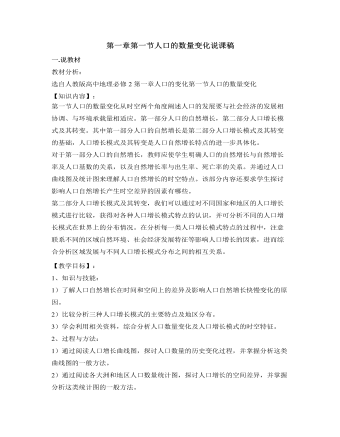
人教版高中地理必修2第一章第一节人口的数量变化说课稿
活动一:课本第三页的活动题,把学生分成几组然后让他们读图讨论,思考书上的几个问题,最后派个代表回答问题.最后教师做适当的补充:人口的自然增长不仅与人口自然增长率有关,而且还与人口基数有关.活动二:课本第七页的活动,先让两位学生阅读第六页的案例结合活动题思考问题,让几个组学生讨论所给的几个问题.让学生归纳最后教师做适当的补充.时间安排:由于本节内容不难因此整个教学过程是一节课的时间来完成的因此在教学过程中注意时间的把握,在做活动和讨论时注意把握时间,自己尽量少说废话.课堂小结通过这一节的学习,同学们正确理解和认识人口增长,增长模式和人口增长模式的转变。我们可以利用比较法、分析法来掌握,并联系现实生活,进行分析、判断,化理论知识于实践之中。
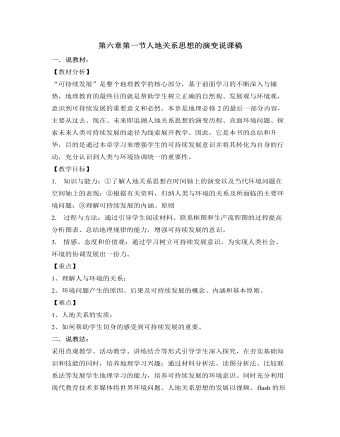
人教版高中地理必修2第六章第一节人地关系思想的演变说课稿
四、说教学过程:1、导入新课:以视频形式导入新课,说明环境问题产生原因,引出人地关系的重要性2、新课讲授:学习主题一:过去——人地关系的历史回顾以动画形式展现人地关系思想的发展,激发学生学习本专题的兴趣,归纳人与自然关系的演变过程。学习主题二:现状——直面环境问题以人类与环境关系模式图说明环境问题产生的原因,人地关系实质;以因果联系框图培养学生判读方法,了解人口、资源与环境三者之间的关系;通过阅读课文,了解环境问题的类型及其空间差异的表现;以图表了解不同国家和地区环境问题在空间轴上的表现;以《京都议定书》为引子说明保护环境是全人类的共同使命学习主题三:未来——可持续发展展示“可持续发展示意图”理解可持续发展内涵、原则
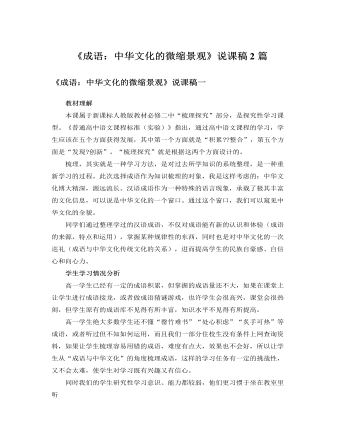
人教版高中语文必修2《成语:中华文化的微缩景观》说课稿2篇
(三)教学目标1、明确成语的来源,了解成语的结构特点。2、学习积累成语的方法。3、梳理学习过的成语,做到能正确理解、使用所学的常用成语。(四)教学重点和难点1、学习积累成语的方法。2、正确理解、使用所学的常用成语。二、说教法新的《高中语文课程标准》要求学生主动去发现问题、解决问题,教师是课堂学习的组织者、参与者,是课堂的主导,而不是课堂的主体。而且,新的课程标准要求学生“能围绕所选择的目标加强语文积累,在积累的过程中,注重梳理”。在这种前提下,本节课可以采取以下方法:由于这种梳理是对学生已有的知识进行归纳分类,可能显得比较枯燥。为了避免这种枯燥感,可以采取设置情境和分组竞答的方法,调动学生的积极性。
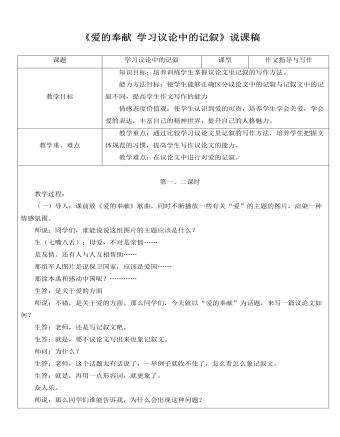
人教版高中语文必修3《爱的奉献 学习议论中的记叙》说课稿
教学过程:(一)导入:课前放《爱的奉献》歌曲,同时不断播放一些有关“爱”的主题的图片,渲染一种情感氛围。师说:同学们,谁能说说这组图片的主题应该是什么?生(七嘴八舌):母爱,不对是亲情……是友情、还有人与人互相帮助……那组军人图片是说保卫国家,应该是爱国……那徐本禹和感动中国呢?…………生答:是关于爱的方面师说:不错,是关于爱的方面。那么同学们,今天就以“爱的奉献”为话题,来写一篇议论文如何?生答:老师,还是写记叙文吧。生答:就是,要不议论文写出来也象记叙文。师问:为什么?生答:老师,这个话题太有话说了,一举例子就收不住了,怎么看怎么象记叙文。生答:就是,再用一点形容词,就更象了。众人乐。师说:那么同学们谁能告诉我,为什么会出现这种问题?一生小声说:还不是我们笨,不会写。师说:不是笨,也不是不会写,你们想为什么记叙文就会写,一到议论文就不会了,那是因为同学们没有明白议论文中的记叙与记叙文中的记叙有什么不同,所以一写起议论文中的记叙,还是按照记叙文的写法写作,这自然就不行了。那好,今天我们就从如何写议论文中的记叙讲起。
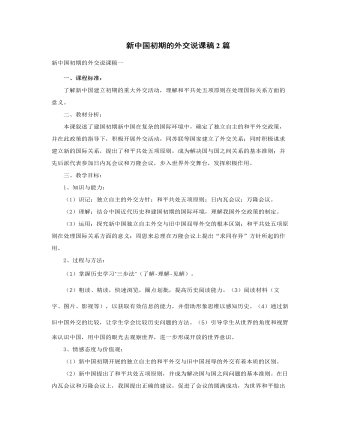
人教版高中历史必修1新中国初期的外交说课稿2篇
四、教学过程1.导入新课(2分钟)出示中非合作论坛暨第3届部长级会议图片。用时事引起学生注意,设问,“55年前,亚洲与非洲有哪一次跨越印度洋的握手”,提示答案“万隆亚非会议”,给出答案导入新课2.外交环境:学生阅读,教师分析。(3分钟)3.外交方针之一:独立自主的和平外交方针(5分钟) 出示材料:《共同纲领》引文。学生、阅读、提炼除新中国奉行独立自主的外交政策。进而由学生分析另起炉灶、打扫干净屋子再请客和一边倒。培养学生分析材料、利用材料的能力过度:新中国作出一边倒大的积极主动态势,社会主义阵营的兄弟们也立刻作出了积极回应。1949年10月2日,中苏建立了外交关系。4.外交建树之一:同苏联等17个国家建立外交关系(3分钟)出示毛泽东访问苏联等图片和第一批建交的17个国家名字
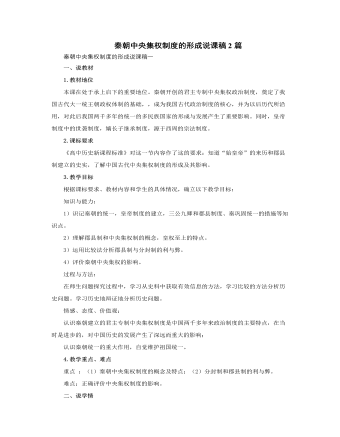
人教版高中历史必修1秦朝中央集权制度的形成说课稿2篇
问题设计:通过这一课的学习,同学们能解释君主专制中央集权制度的含义吗?【总结】封建专制主义中央集权制度包括专制主义和中央集权制两个概念。专制主义是就中央的决策方式而言的,主要体现在皇位终身制和世袭制上,特征是皇帝个人独裁专断,集国家最高权力于一身,从决策到行使军政财权都具有独断性和随意性;中央集权则是相对于地方分权而言,其特点是地方政府在政治、经济、军事等方面没有独立性,必须充分执行中央的政令,一切服从于中央。三、秦朝中央集权制的影响展示图片:《秦朝疆域图》正是由于有一个统一集中的中央政权,秦王朝才能积极开拓疆域,北拒匈奴,南吞百越,有利于我国多民族国家统一发展。为了巩固统一的国家,秦朝还通过实行哪些措施巩固统一局面?展示图片:“秦半两钱”“秦权”“小篆”“秦简”等图片。正是有一个强有力中央政府,才统一了货币、文字、度量衡,才开驿道、修灵渠,从而促进了中国经济文化的发展进步。展示“孟姜女哭长城”的故事材料从故事及你所掌握的材料中,你认为秦朝能否长治久安?为什么?